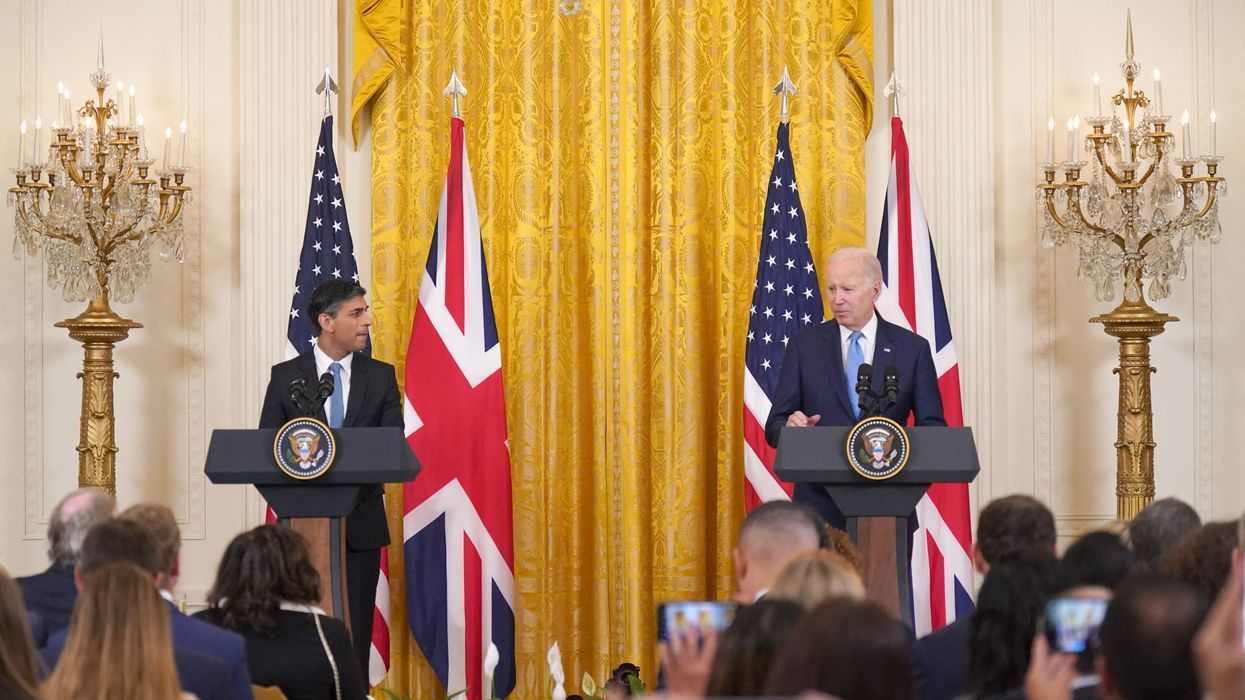The US and Britain unveiled a fresh strategic pact on Thursday (08), reaffirming their commitment to the "special relationship" in order to counter the challenges posed by Russia, China, and economic instability.
During a summit held at the White House, US President Joe Biden and British Prime Minister Rishi Sunak presented a unified stance regarding Russia's invasion of Ukraine and the rapid advancements in artificial intelligence.
However, Sunak's aspirations for a post-Brexit free-trade agreement with Washington did not materialise, as the British Prime Minister agreed to align with Biden's vision of establishing a new green economy through extensive industrial subsidies.
The leaders have adopted an "Atlantic Declaration" with the objective of enhancing industry connections in defense and renewable energy sectors, as a response to the increasing competition posed by authoritarian states.
"Countries like China and Russia are willing to manipulate and exploit or steal our intellectual property, use technology for authoritarian ends, or withdraw crucial resources like energy," Sunak told a news conference alongside Biden.
"They will not succeed," he added.
As part of the declaration, both parties have agreed to initiate discussions regarding the US' handling of critical minerals utilised in electric batteries, specifically in the context of Britain.
Biden has also committed to seeking congressional designation of Britain as a domestic source for defense procurement. This designation aims to expedite the advancement of cutting-edge weapons, including hypersonic missiles.
- 'Never been stronger' -
Despite the lack of a trade deal, Sunak said "the economic relationship has never been stronger," describing the "special relationship" as in fact the "indispensable alliance."
For Sunak, his inaugural White House summit held significance in not only reestablishing personal connections but also overcoming the impact of multiple prime minister changes in Britain last year.
Additionally, given Biden's strong ties to his Irish heritage, he openly expressed his dissatisfaction with Boris Johnson's management of Northern Ireland.
Biden acknowledged that, for the US, no other country held comparable importance to Britain, a sentiment that was unlikely to have been expressed during the post-Brexit disagreements experienced under Johnson's leadership.
Both leaders reached a consensus on the notion that the global economy is undergoing its most significant transformation since the Industrial Revolution.
They recognised that artificial intelligence (AI) is a driving force behind these changes, which has prompted concerns about the potential existential threat posed by sentient machines.
To mitigate these risks, coordinated action by governments is deemed necessary.
Biden expressed support for Sunak's proposal to bring together "like-minded" nations for the world's inaugural AI summit, scheduled to take place in Britain later this year.
In addition, Sunak aims to establish an AI regulatory body in the UK.
"The potential of AI is staggering," the president said, saying it had "the potential to do great damage if it's not controlled."
"We are looking to Great Britain to help lead a way through this. There is no country we have greater faith in to help negotiate our way through this," Biden added.
However, Sunak's aspirations face challenges as the US and the European Union are already involved in their own discussions regarding an AI code of conduct. Industry experts have been advocating for regulations in the field.
- NATO leadership -
Biden and Sunak made a joint commitment to continue leading international efforts in support of Ukraine, following their pledge to provide billions of dollars in military assistance to aid Kyiv in its fight against Russian invaders.
Biden said that they discussed their "unwavering support for the people of Ukraine who are defending themselves against most brutal aggression we have seen in a long time."
"I want to thank the prime minister for his strong, strong leadership," he said, also voicing confidence that the United States, despite hesitation from some of his Republican rivals, will provide "funding necessary to support Ukraine as long as it takes."
During their meeting, Sunak and Biden engaged in a discussion regarding the leadership of NATO, as the alliance prepares for an upcoming summit in Vilnius next month.
Among the contenders for the position, British Defense Secretary Ben Wallace was a topic of consideration.
"They have a candidate who's a very qualified individual," Biden said of Wallace's candidacy, responding "maybe" when asked if it was time for another British secretary-general of NATO.
The incumbent Secretary-General, Jens Stoltenberg, who has earned commendation from allies for his leadership during the conflict, is set to depart from his position in October.
Stoltenberg had previously extended his tenure, delaying his appointment as the central bank chief in Norway.
But Biden emphasised the necessity for consensus within NATO regarding the selection of the next Secretary-General.
Contenders for the role include the prime ministers of Denmark and Estonia, who are both regarded as potential candidates.
(AFP)




